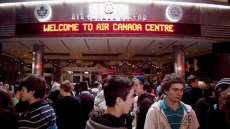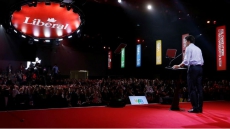UNITED NATIONS, N.Y. — Following is a condensed version of the prepared text of Prime Minister Justin Trudeau's remarks Thursday to the UN General Assembly:
Mr. President, fellow delegates, friends.
Before I begin, I would like to offer Canada's condolences, in the light of Tuesday's earthquake in Mexico, to all families and friends in mourning.
We wish a speedy recovery for all those who have been injured, and thank all first responders for their tireless efforts to help keep people safe.
Our thoughts are also with our friends in the Caribbean who continue to suffer from devastating hurricanes.
The generosity and resilience that millions have shown in the face of these natural disasters is an inspiration to the world, and Canada stands ready to lend a helping hand in whatever way it can.
It is an honour to be back here with you today, and to have an opportunity to speak to this year's theme: "Focusing on people: striving for peace and a decent life for all on a sustainable planet." ...
Canada remains a work in progress.
So I want to tell you about the Canadian experience because for all the mistakes we've made, we remain hopeful.
Hopeful that we can do better, and be better, and treat each other with the dignity and the respect that is the birthright of every human being.
I want to tell you our story because I know that the challenges we have faced — and continue to face — are not unique in the world.
And neither are the solutions.
An approach that values human dignity — that emphasizes fairness and real opportunity for everyone — has a home in Canada and in every country.
It's an approach that doesn't just serve domestic needs, but that makes the world a better, more peaceful, more prosperous place for all.
This year, in 2017, Canada celebrated the 150th anniversary of Confederation. Our 150th birthday, if you will.
But Canada is much older than that.
It has been home to the descendants of settlers and immigrants for hundreds of years, and Indigenous Peoples for millennia.
We are a country is built on different cultures, different religions, different languages all coming together.
That diversity has become our great strength.
But that is not and has not always been true for everyone who shares our land.
Canada is built on the ancestral land of Indigenous Peoples — but regrettably, it's also a country that came into being without the meaningful participation of those who were there first.
And even where treaties had been formed to provide a foundation for proper relations, they have not been fully honoured or implemented.
For First Nations, Metis Nation and Inuit peoples in Canada, those early colonial relationships were not about strength through diversity, or a celebration of our differences.
For Indigenous Peoples in Canada, the experience was mostly one of humiliation, neglect, and abuse. ...
There are, today, children living on reserve in Canada who cannot safely drink, or bathe in, or even play in the water that comes out of their taps.
Happening now – my address to world leaders at the @UN General Assembly. Watch it here: https://t.co/NRYy0B7uu0
— Justin Trudeau (@JustinTrudeau) September 21, 2017
There are Indigenous parents who say goodnight to their children, and have to cross their fingers in the hopes that their kids won't run away, or take their own lives in the night.
Young Indigenous people in Canada struggle to get a good education.
And though residential schools are thankfully a thing of the past, too many Indigenous youth are still sent away, far from their families, just to get the basic education most Canadians take for granted.
And for far too many Indigenous women, life in Canada includes threats of violence so frequent and severe that Amnesty International has called it "a human rights crisis."
That is the legacy of colonialism in Canada.
Of a paternalistic Indian Act.
Of the forced relocation of Inuit and First Nations communities, and a systematic denial of Metis rights and history.
Of residential schools that separated children as young as five years old from their families, punished them for speaking their own language, and sought to extinguish Indigenous cultures entirely.
The good news is that Canadians get it. They see the inequities. They're fed up with the excuses.
And that impatience gives us a rare and precious opportunity to act.
We now have before us an opportunity to deliver true, meaningful and lasting reconciliation between Canada and First Nations, the Metis Nation, and Inuit peoples. ...
In the words of Canada's Truth and Reconciliation Commission, the declaration provides "the necessary principles, norms, and standards for reconciliation to flourish in twenty-first-century Canada."
That's not an aspiration. That's a way forward.
Last year, at the United Nations Permanent Forum on Indigenous Issues, Canada's then minister of Indigenous and Northern Affairs finally corrected Canada's position on the declaration, and announced that we are now a full supporter of the declaration, without qualification.
In partnership with Indigenous Peoples, we're moving ahead with a thorough review of federal laws, policies, and operational practices, to get our house in order.
To make sure that our government is meeting its obligations, including international obligations under the declaration.
We know that the world expects Canada to strictly adhere to international human rights standards — including the United Nations Declaration on the Rights of Indigenous Peoples — and that is what we expect of ourselves, too.
We are working closely with Indigenous Peoples in Canada to better respond to their priorities, to better understand how they see and define self-determination, and to support their work of nation rebuilding.
Along with Indigenous partners, we are co-developing programs to ensure the preservation, protection and revitalization of Metis, Inuit and First Nations languages.
In short, we have been working hard, in partnership with other orders of government, and with lndigenous leaders in Canada, to correct past injustices and bring about a better quality of life for Indigenous Peoples in Canada.
I'll give you a few examples.
Many will sound familiar to you, because they are closely aligned with the UN's Sustainable Development Goals — goals that apply to all of our countries, without exception.
Our efforts include investments to help bring safe and clean drinking water to all Indigenous communities - part of the UN's Sustainable Development Goal #6: clean water and sanitation.
So far, more than two dozen long-term drinking water advisories in Indigenous communities have been eliminated, and we have a plan to bring to an end those that remain. ...
That's why our efforts include working with Indigenous communities to help build and refurbish homes.
Construction work on nearly 4,000 homes has been completed or is underway, helping to fulfil SDG #11: making communities safe and sustainable places to live.
And across the country, we are also working on a National Housing Strategy, to give more Canadians access to housing that is safe, adequate, and affordable.
Our efforts also include a stronger focus — in Indigenous communities, across Canada, and around the world — on SDG #5: combating gender-based violence and giving women and girls equal opportunities to succeed.
We need women and girls to succeed because that's how we grow stronger economies, and build stronger communities.
That is why our government will be moving forward shortly with legislation to ensure equal pay for work of equal value.
You see, the Sustainable Development Goals are as meaningful in Canada as they are everywhere else in the world, and we are committed to implementing them at home while we also work with our international partners to achieve them around the world.
This is important, because poverty and hunger know no borders. We cannot pretend that these solvable challenges happen only on distant shores.
The need for greater equality and decent work — those are real and persistent human needs. Ones we cannot afford to ignore especially in our own countries. ...
In Canada, this means new relationships between the government of Canada and Indigenous Peoples - relationships based on recognition of rights, respect, co-operation and partnership.
Recently, we made changes to our own government structures, to help with the transition to these new relationships with Indigenous Peoples.
We are dismantling the old colonial bureaucratic structures and creating a new department of Crown-Indigenous Relations and Northern Affairs, led by Dr. Carolyn Bennett, an experienced and effective advocate for Indigenous Peoples in Canada.
In her new role, she will lead our government's efforts to better support Indigenous Peoples as they strengthen their distinct political, cultural, legal and economic institutions, and assume autonomy over their own affairs, including the recognition and implementation of self-government as an expression of self-determination.
At the same time, we recognize that in Canada, the federal government has a historic responsibility for providing services to Indigenous Peoples, and an ongoing role to play.

To better do this work — while at the same time supporting Indigenous self-determination — we will create, in consultation with Indigenous Peoples, a new Department of Indigenous Services, led by our former minister of health, Dr. Jane Philpott.
Over time, programs and services will increasingly be delivered by Indigenous Peoples, as part of their move toward true self-government, and the full implementation of the United Nations Declaration on the Rights of Indigenous Peoples. ...
For the federal government, this means making changes to how we operate. The departmental change I mentioned is part of fulfilling that responsibility.
For Indigenous Peoples, it means taking a hard look at how they define and govern themselves as nations and governments, and how they seek to relate to other orders of government.
Indigenous Peoples will decide how they wish to represent and organize themselves.
Some may choose to engage with our government based on historic nations and treaties, others will use different shared experiences as the basis for coming together.
The choice is theirs. This is precisely what self-determination demands.
Though this path is uncharted, I am confident that we will reach a place of reconciliation.
That we will get to a place as a country where nation-to-nation, government-to-government, and Inuit-Crown relationships can be transformed.
A place where the standards enshrined in the UN Declaration of the Rights of Indigenous Peoples are fully realized - not merely by government mandate, but in true partnership with Indigenous Peoples.
Part of that new partnership will involve addressing the shared challenge of climate change.
Indigenous and northern communities are particularly affected by its stark reality.
In communities across the north — places like Paulatuk, Kugluktuk and Tuktoyaktuk — where community members are finding sea ice conditions more dangerous and unpredictable for travelling and hunting in the winter.
In Canada's western Arctic, the permafrost is melting and huge pieces of tundra are eroding into the ocean.
And around Baffin Island, Inuit elders are finding it difficult to forecast the weather like they used to. So difficult that many are now reluctant even to try.
At home, we are working hard to help these communities adapt and prepare for the future.
At the international level, our commitment is unwavering.
There is no country on this planet that can walk away from the reality of climate change.
And for our part, Canada will continue to fight for the global plan that has a realistic chance of countering it.
We have a responsibility to future generations, and we will uphold it.
We have a chance to build in Canada — and in fact, all around the world — economies that are clean, that are growing, that are forward-looking. We will not let that opportunity pass us by. ...
Likewise, the global community has a responsibility to do all that it can to reduce inequality within and among countries.
In Canada, we are working hard to achieve this goal.
We improved child benefit payments. Our new program gives nine out of 10 families more money to help with the high cost of raising their kids, and because of that, we expect to reduce child poverty in Canada by 40 per cent.
We raised taxes on the wealthiest one per cent so that we could lower them for the middle class, and we're continuing to look for ways to make our tax system more fair.
Right now we have a system that encourages wealthy Canadians to use private corporations to pay a lower tax rate than middle class Canadians.
That's not fair, and we're going to fix it. ...
We are also working hard to deliver progressive trade agreements like the Comprehensive Economic and Trade Agreement with the European Union, which comes into effect today.
CETA will expand opportunities for businesses; create good, well-paying jobs for workers; and deliver meaningful economic growth - the kind of growth that benefits all our citizens, not just the wealthiest.
We have the opportunity - and I would argue we have the responsibility - to ensure that trade agreements include strong provisions to safeguard workers' rights, to protect the environment, and to ensure that the benefits of trade are felt more broadly.
Because when we do that, we don't just grow our economies — we live up to our values.
And we say to ourselves and to each other that good enough … just isn't good enough. That better is always possible. ...
Our efforts to build a better relationship with Indigenous Peoples in Canada are not only about righting historical wrongs.
They are about listening, and learning, and working together. They are also about concrete action for the future.
The reconciliation we seek has lessons for us all.
We can't build strong relationships if we refuse to have conversations.
We can't chart a more peaceful path if the starting point is suspicion and mistrust.
And we can't build a better world unless we work together, respect our differences, protect the vulnerable, and stand up for the things that matter most.
As I said last year, we know it will be hard work.
But I remain confident — for Canada's experience shows this to be true - that any challenge can be met if we meet it together.
Thank you.






